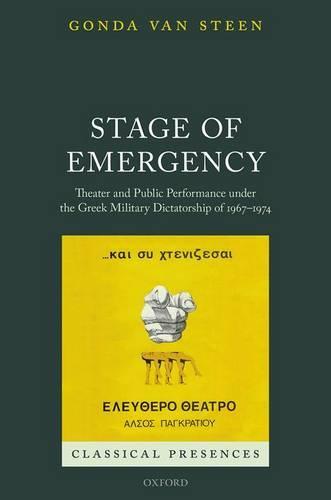Overview
This volume offers a critique of cultural and intellectual life in Greece during the dictatorship of 1967-1974, discussing how Greek playwrights, directors, and actors reconceived the role of culture in a state of crisis and engaged with questions of theater's relationship to politics and community. In the early 1970s, several bold new plays appeared, resonating with the concerns of Greek public and private life. The reinvigorated Greek stage displayed an extraordinary degree of historical consciousness and embraced revisionist cultural critique as well, leading to a drastic re-shaping of the Greek theatrical landscape.Stage of Emergency is the first study to focus on these particular theatrical developments of the so-called junta era, shedding light not only on the messages and impact of the plays themselves, but also on the politics of culture and censorship affecting the Greek public during this period.
Full Product Details
Author: Gonda Van Steen (Cassas Chair in Greek Studies, Cassas Chair in Greek Studies, University of Florida)
Publisher: Oxford University Press
Imprint: Oxford University Press
Dimensions:
Width: 14.60cm
, Height: 2.80cm
, Length: 21.60cm
Weight: 0.608kg
ISBN: 9780198718321
ISBN 10: 0198718322
Pages: 396
Publication Date: 18 December 2014
Audience:
College/higher education
,
Professional and scholarly
,
Tertiary & Higher Education
,
Professional & Vocational
Format: Hardback
Publisher's Status: Active
Availability: To order

Stock availability from the supplier is unknown. We will order it for you and ship this item to you once it is received by us.
Reviews
To sum up, Gonda Van Steen's book restages the history of New Greek Theatre by conducting a cultural history of the dictatorship (p. 304). Her work is valuable not only because it traces out a legacy of practices and thematic and aesthetic mechanisms that constitute the theatre of the last quarter of the twentieth century as she asserts in the last paragraph of her book. It is also valuable because, as I suggest above, the impact and legacy of this cultural production might be detected in other arts like cinema. Finally, it is also politically valuable since it provides proof for a moment in history when an art form had the dynamic and the momentum to shape social consciousness, to promote democratic solutions, to be a transformative power. In that sense, the book also stands as an excavation of our contemporary political imaginary. --Afroditi Nikolaidou, FILMICON: Journal of Greek Film Studies
To sum up, Gonda Van Steen's book restages the history of New Greek Theatre by conducting a cultural history of the dictatorship (p. 304). Her work is valuable not only because it traces out a legacy of practices and thematic and aesthetic mechanisms that constitute the theatre of the last quarter of the twentieth century as she asserts in the last paragraph of her book. It is also valuable because, as I suggest above, the impact and legacy of this cultural production might be detected in other arts like cinema. Finally, it is also politically valuable since it provides proof for a moment in history when an art form had the dynamic and the momentum to shape social consciousness, to promote democratic solutions, to be a transformative power. In that sense, the book also stands as an excavation of our contemporary political imaginary. * Afroditi Nikolaidou, FILMICON: Journal of Greek Film Studies *
Author Information
Gonda Van Steen is Cassas Chair in Greek Studies at the University of Florida.



